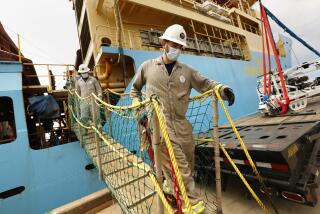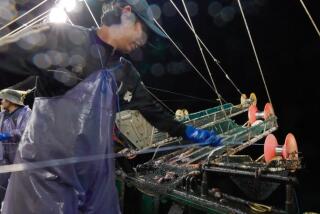Driftnet Fishing Issue Still Tangled
- Share via
The United States has taken the controversy over large-scale ocean driftnet fishing to the United Nations--where it belongs--but Japan is not making it easy to find a solution.
American officials want to set a deadline for imposing limits on the use of the nets because of growing evidence of the massive and indiscriminate killing of mammals, birds and other sea life caught incidentally in the treacherous nets. That enormous kill already is threatening environmental devastation in some areas of the Pacific Ocean, which is why the United States is pressing for prompt action.
Japan, apparently responding to international criticism of the practice, has offered a rival resolution to the U.N. General Assembly calling for further scientific study and “other regulatory measures, including a moratorium on driftnet fishing, if available scientific data confirm the need for such measures.” That could effectively postpone action for many years.
The subject is highly sensitive politically in Japan, Taiwan and Korea, whose fleets do most of the large-scale drift net fishing in international waters. It is also a sensitive issue among American fishermen because many of them use small-scale driftnets. Some 35% of the American salmon catch in Alaska waters is with driftnets, according to a State Department official, and driftnet fishing in other coastal waters, including those of California, has drawn criticism because of the numbers of marine mammals killed incidentally in the operations. But American scientists argue that the incidental kills with the small-scale driftnets is small by comparison with the loss of life in the 30-mile-long nets used by the Asian fishermen and do not have the same environmental impact.
“Too much time has passed for the United Nations to restrict its action to the study of scientific data, which we believe already demonstrates the devastating effect on the environment of this indiscriminate and wasteful fishing technique,” Ambassador Jonathan Moore, alternate U.S. representative to the U.N. General Assembly, said when introducing the American resolution on Nov. 6. He is right. And his call for action at this session of the Assembly is appropriate.
The U.S. resolution would impose a moratorium on all high-seas driftnet fishing by June 30, 1992, unless there has been agreement that the unacceptable impact of the practice can be prevented and that the practice does not interfere with the conservation of ocean resources. In effect, that places the burden of proof on the driftnet fishermen, where it belongs. It is encouraging that the American resolution already has attracted support from such nations as Australia, Canada, New Zealand and some of the Pacific island nations.
More to Read
Sign up for Essential California
The most important California stories and recommendations in your inbox every morning.
You may occasionally receive promotional content from the Los Angeles Times.













